|
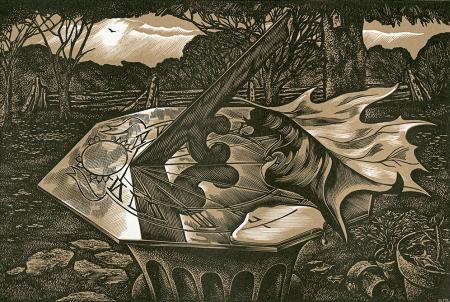
John DePol
1913 - 2004
_______________________
The Letters and Poems of Samuel Beckett
Paul Muldoon
nyt
(....)
Why radio might be the medium “best suited” to Beckett comes down to a single concept — silence. No writer has understood the power of silence better than Beckett. No one has understood better than Beckett that silence is not an absence of sound but a physical presence, perhaps even a character. That certainly seems to be the case with “Krapp’s Last Tape,” the monologue he wrote for Patrick Magee, which is the single greatest evocation of loss and longing of the 20th century. (Beckett’s affection for Magee is one of the many heartwarming discoveries of this volume.) It’s no accident, so, that it was an icon of the “silent” era, Buster Keaton, who would star in Beckett’s “Film” (1965), shot in some of the more dilapidated areas of Lower Manhattan.
(....)
This enduring, endearing self-doubt is a mark of most great writers. For some, it may seem like a pose. Not for Beckett. Again and again, this volume of letters allows Beckett to come off as being genuinely assured of his vision of, say, how a part should be interpreted (describing one recalcitrant actor as “another Beckett specialist”), while being genuinely uncertain about his own role. Writing to the translator Arland Ussher in 1962 about Ussher’s musings on “Beckettism,” he asserts:
“My unique relation — and it a tenuous one — is the making relation. I am with it a little in the dark and fumbling of making, as long as that lasts, then no more. I have no light to throw on it myself and it seems a stranger in the light that others throw.”
...(more)
_______________________
Is There a Vespa?: An Interview with Michael Hofmann
Paris Review
(....)
Discouraging, isn’t it? It’s just a fact that there are never very many poets around at any given time. I think poetry is always one or two poets away from extinction anyway. If it’s any comfort, it’s not a living tradition—it doesn’t depend on being passed from hand to hand. It could easily go underground for a couple of decades, or a couple of centuries, and then return. People disappear, or never really existed at all, and then come back—Propertius, Hölderlin, Dickinson, Büchner, Smart. Poetry is much more about remaking or realigning the past than it is about charting the contemporary scene. It’s a long game.
...(more)
_______________________

Landscape in North Wales
Stanley Spencer
d. December 14, 1959
_______________________
You Make Me Opaque
Melody Nixon
conjunctions
(....)
We Try to Share Perspective, Both Looking to Smash Something.
“Night in St. Petersburg is virulent, insidious. I do not support him.”
—Leo Tolstoy
We do leave the coffee shop. Time passes. Listen. Time passes. I am willing to allow that. I am hungry and I eat cold cut meats that have stuck to the back of the fridge. I like to eat cold meats. I like to eat cake, but I couldn’t eat any. I watched your change lie, untouched, on the coffee counter. I lie in a white-night bed, think, I could imagine this place as St. Petersburg. Yes, I will give it that name: Think, for the light. I try to feel the night’s femininity, believe it is there. I imagine her embracing me, lying draped over me, tensing beneath me. I stir my hands through pools of her, let her flow like hair down my body. I search for muscles, but find none. I think of the audience I dreamed of, grow tired, and sleep.
...(more)
_______________________
Verso 2014: Free Ebook Collection
With contributions from leading radical names including Arundhati Roy, Benjamin Kunkel, Gabriella Coleman, James Meek, Nadya Tolokonnikova, Shlomo Sand, Walter Benjamin and Slavoj Žižek, this volume covers topics ranging from philosophy and Israel-Palestine politics, through to the politics of sex work, Mexico, feminism, and the misery of contemporary capitalism.
_______________________
Introducing the Emerging Toronto Poets Folio
lemon hound
_______________________
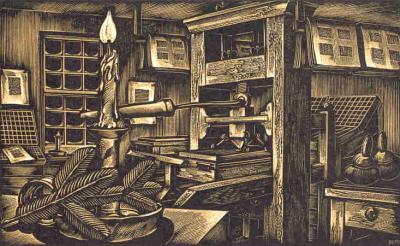
Old Printing Office
John DePol
_______________________
Making AI Philosophical Again: On Philip E. Agre’s Legacy
Jethro Masís
(....)
The point, in any case, is that the practical reality with which AI people struggle in their work is not just ‘the world,’ considered as something objective and external to the research. It is much more complicated than this, a hybrid of physical reality and discursive construction. The trajectory of AI research can be shaped by the limitations of the physical world—the speed of light, the three dimensions of space, cosmic rays that disrupt memory chips—and it can also be shaped by the limitations of the discursive world—the available stock of vocabulary, metaphors, and narrative conventions.
This also gives hints as to how exogenous discourses, like philosophy, are supposed to be incorporated into technological practices. Agre is of the opinion that the point is not to invoke Heideggerian philosophy, for example, as an exogenous authority thus supplanting technical methods: “the point, instead, is to expand technical practice in such a way that the relevance of philosophical critique becomes evident as a technical matter.
(....)
On Agre’s view, traditional AI practitioners have not conscientiously attended to this partitioning of levels of analysis. Particularly, the reflexive level that prescribes an awareness of the role of metaphors in technical work has been disdained, as though AI researchers could simply bootstrap their way to technical success without being aware of the underlying metaphors pervading their work. For Agre, this is particularly problematic because “as long as an underlying metaphor system goes unrecognized, all manifestations of trouble in technical work will be interpreted as technical difficulties and not as symptoms of a deeper, substantive problem”.
...(more)
Phil Agre, an appreciation Michael Travers (....)
Phil was a seminal figure in the development of Internet culture. His Red Rock Eater email list was a early predecessor to the many on-line pundits of today. Essentially he invented blogging, although his medium was a broadcast email list rather than the web, which didn't yet exist. He would regularly send out long newsletters containing a mix of essays, pointers to interesting things, and opinions on random things. He turned email into a broadcast medium, which struck me as weird and slightly undemocratic at the time, but he had the intellectual energy to fuel a one-man show, and in this and other matters Phil was just ahead of the times -- now the web is stuffed to the brim with outsized personalities, but it wasn't so back then. Here's one of the last recorded posts on RRE, on Vaclav Havel, which includes an explanation of what Phil termed "issue entrepreneurship". I picked this out at basically at random from the archives, and it typifies the insight, clarity, and urgency of Phil's writing:
What is needed and missing in the United States is the other major component of Vaclav Havel's life story -- the intellectual seriousness that believed down deep that the world is made of ideas and that the health of a society depends on the health of its language. ... Civilization cannot survive when language becomes the terrain of a thoroughly instrumentalized political war. Vaclav Havel and his colleagues won a contest of decency against the dead hand of an authoritarian system that had nothing living inside it. Today's authoritarians are altogether more resourceful. Today's civil society will have to discover a correspondingly deeper meaning in its own ideals. ...(more)
Computation and Human Experience
Philip Agre
1997 google books
pdf at Monoskop Log
Technology and Privacy: The New Landscape
Philip E. Agre, Marc Rotenberg
1998
google books
Philip E. Agre
Philip E. Agre
The Network Observer
monthly from January 1994 to July 1996
Red Rock Eater News Service
mid-1990s, ran for around a decade
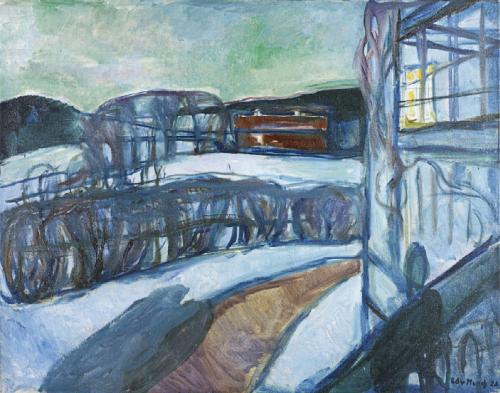
Winter Night
1923
Edvard Munch
b. December 12, 1863
_______________________
Poetry from Eileen R. Tabios
entropy
Reproductions of the Empty Flagpole
[6]
I forgot clutching the wet mane of a panicked horse…. I forgot the night was unanimous…. I forgot how an erasure captures the threshold of consciousness…. I forgot how one begins marking time from a lover’s utterance of Farewell…. I forgot Mom beginning to age when she started looking at the world through heartbreaking resignation…. I forgot dancing furious flamenco with vultures under a menopausal sun…. I forgot learning to appreciate rust, and how it taught me bats operate through radar…. I forgot the plainest of bread can clear an oenophile’s palate…. I forgot dust motes trapped in a tango after the sun lashed out a ray…. I forgot the bliss deep within an ascetic’s eyes as he wandered with a beggar’s bowl…. I forgot how detachment includes. I forgot how detachment enabled a white rattlesnake to penetrate my dreams.
...(more)
Eileen R. Tabios at the Poetry Foundation
_______________________
from Citizen: “Some years there exists a wanting to escape...”
Claudia Rankine
Some years there exists a wanting to escape—
you, floating above your certain ache—
still the ache coexists.
Call that the immanent you—
You are you even before you
grow into understanding you
are not anyone, worthless,
not worth you.
Even as your own weight insists
you are here, fighting off
the weight of nonexistence.
And still this life parts your lids, you see
you seeing your extending hand
as a falling wave—
...(more)
Claudia Rankine at the Poetry Foundation
_______________________
Claudia Rankine Interview
by Lauren Berlant
bomb
I met Claudia Rankine in a parking lot after a reading, where I said crazy fan things like, “I think we see the same thing.” She read a book of mine and wrote me, “Reading it was like weirdly hearing myself think.” This exchange is different from a celebration of intersubjectivity: neither of us believes in that . Too much noise of racism, misogyny, impatience, and fantasy to weed out. Too much unshared lifeworld—not just from the difference that racial experience makes but also in our relations to queerness, to family, to sickness and to health, to poverty and wealth—while all along wondering in sympathetic ways about the impact of citizenship’s embodiment. Plus, it takes forever to get to know someone and, even then, we are often surprised—by ourselves, by each other. Claudia and I have built a friendship through consultation about whether our tones are crazy, wrong, off, or right; about whether or not our observations show something, and what. And, through frankness: a form of being reliable that we can trust, hard-edged as it can be, loving as it can be (and sometimes the former is easier to take than the latter). We are both interested in how writing can allow us to amplify overwhelming scenes of ordinary violence while interrupting the sense of a fated stuckness. This interview, conducted via email, walks around how we think with and against the convenience of conventionally immiserated forms of life and art.
...(more)
_______________________
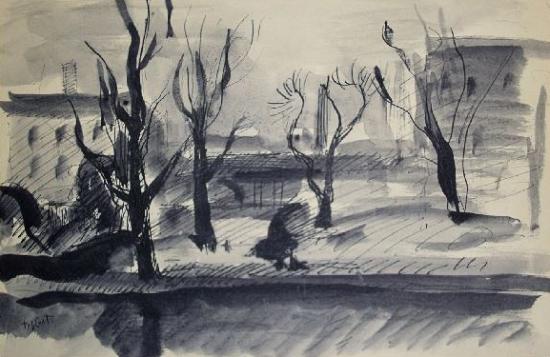
Paysage d'hiver
1938
Pierre Tal-Coat
b. December 12, 1905
_______________________
Anthropo{mise-en-s}cène
McKenzie Wark
Public Seminar Commons
So this is the Anthropocene: An historical time, perhaps even a geological time, in which what we think of as separate entities, the human and the natural, find their fates entwined. What was once a separate nature or environment is no in place to ground us as us.
Not only is God dead, so too is ecology, that pantheistic place God went into hiding. The biosphere is no longer a self-correcting, homeostatic deity. The later civilizations, said Valery, know they are mortal. This last civilization know the Earth is mortal too.
I feel like Nietzsche’s madman in the marketplace, saying such things. Nobody really wants to know that the world we inherited, the world of our ancestors, is already something unreal. People shrug it off, change the subject. Yet as Canada’s national poet Leonard Cohen once memorably put it: everybody knows. Everybody knows things can’t go on.
Cinema knows it. One of the things cinema is there for is to find some kind of objective correlative for feelings that can’t be acknowledged. Maybe cinema is not about desire at all, or even anxiety. Maybe it is about seduction, of turning us aside from unacknowledged feelings, and slipping us into worlds of objects and relations that displace those feelings onto something else. Thus: perhaps all cinema is now about the Anthropocene. Its all about a sense that this is not a Never Ending Story.
...(more)
_______________________
Fall
Conor O'Callaghan
To unbalance. To keel over, accidentally, or submit to the pressures of gravity.
To plummet in worth, especially currency.
To lose altitude. To take place at some pre-ordained time and date.
To swallow tall tales at face value.
To lag such a distance back along the trail as to disappear from view.
To surrender, especially a country,
to the enemy camped in its margins for all of two nights and three days.
To vanish from the radar of grace.
To have no qualms any longer when it comes to telling friends and foes alike
precisely where to stick
their olive branches. To be the kind of sap who lapses now and then
into clandestine amorous crushes.
To indulge a whole continent its own broadleaf syllable for autumn.
To arrive back unexpectedly in the afternoon
and happen upon yourself dancing a single-handed two-step on the landing
to Bechet’s ‘As-tu le Cafard?’
...(more)
Conor O'Callaghan at the Poetry Foundation
_______________________
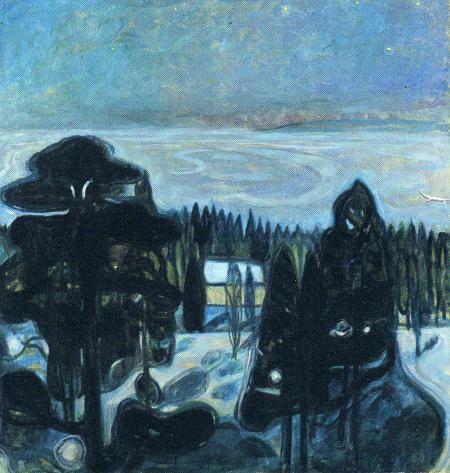
White Night
Edvard Munch
1901
_______________________
The Poetics of Spaces: After Rain
Janice Lee
entropy
(....)
After rain, we already know that it all looks different. This city, you, me. Rain changes everything and we only know to keep deferring moments until the next time it rains. When it rains, the people in this city seem to be in perpetual deferment. The clouds that move as the rain refuses to abate, the rain lasts for as long as it lasts and no longer, and during the rain, it either feels like a single, glistening moment or like a deeply black eternity. I wonder how wet I can get before I am filled to the brim. Because of the weather, plans change and so do my eyes. I can’t tell colors and it’s raining all over the place and I just want to sit down in a puddle and soak.
After rain, no matter how torrentious it might have been, we wonder where did it go: the rain. How could it leave us so quickly? The air is thick. No. It isn’t. It’s rather thin now. And all the bodies that accumulated inside of houses, under rooftops, slowly stumble out and blink and stutter. After rain, we stutter.
No. After rain, we wait.
...(more)

Ponte-Campovasto
1914
Peder Mørk Mønsted
b. December 10, 1859
_______________________
The Neuroplastic Dilemma: Consciousness and Evolution
Franco Berardi Bifo
(....)
The unbridgeable gap between information (zero-dimensional and a-temporal) and the body (multidimensional and evolving in time) is the condition of the interminability of the process of subsumption. The game is over, but the game is continuously opening again.
The current theoretical focus on neuroplasticity can pave the brain to adapt to an environment that grows every day more intolerable for a psychological, aesthetic, and ethical mind that was forged in a previous age of human civilization. Adaptation to the connective mode of communication, adaptation to the ferocity of competition, to the barbarity and horror of the submission of life and attention to financial abstraction, may take the form of a sort of social lobotomy: a pharmacological or surgical cancellation of what in the human psyche is incompatible with abstract domination.
But there is an alternative possibility. It lies in the conscious ability of the brain to reshape itself.
In order to conceptualize the shift from the past forms of political action—now devoid of effectiveness—to the evolutionary horizon of conscious neuro-evolution, a preliminary question has to be answered: What is the relationship between consciousness and evolution? Can we envisage a nondeterministic adaptation to neuroplastic evolution? Can we consciously govern this neuro-evolution?
In order to answer this question, we should focus on the relationship between aesthetic sensibility and the epistemic foundation of social action. Then we should focus on the creation of a platform (social, cultural, institutional, artistic, neuroengineering) for the self-organization of the general intellect and the recomposition of the networked activity of millions of cognitive workers worldwide, who must get reacquainted with their social, erotic, and poetic body.
We must to walk this territory where technology meets epistemology, psychopathology meets poetry, and neurobiology meets cultural evolution.
...(more)
e-flux journal issue 60
_______________________
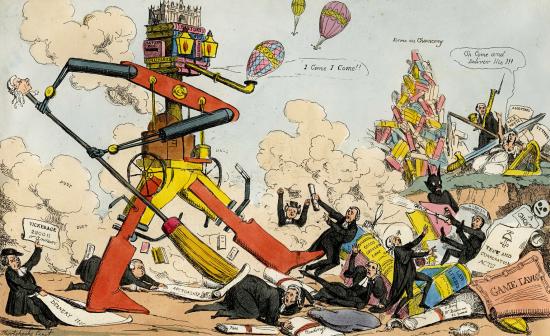
March of Intellect
William Heath
c1830
.....................................................
Future perfect
Social progress, high-speed transport and electricity everywhere – how the Victorians invented the future
Iwan Rhys Morus
aeon
Bfore the beginning of the 19th century, the future was only rarely portrayed as a very different place from the present. The social order, like the natural order, was supposed to be static, with everything in its proper place: as it had been, so it would be. When Sir Isaac Newton thought about the future, he worried about the exact date of Armageddon, not about how his science might change the world. Even Enlightenment revolutionaries usually argued that what they were doing was restoring the proper order of things, not creating a new world order.
It was only around the beginning of the 1800s, as new attitudes towards progress, shaped by the relationship between technology and society, started coming together, that people started thinking about the future as a different place, or an undiscovered country – an idea that seems so familiar to us now that we often forget how peculiar it actually is.
...(more)
.....................................................
Inventing the future
Mike Ashley
Discovering Literature: Romantics and Victorians - The British Library
_______________________

photo - mw
_______________________
Our Connection to the Future
John G. Messerly
Ethical Technology
(....)
So the copy and transfer of your old mind file—like the data on an old computer—would preserve, at most, only a sliver of a past self. Furthermore, the old mind file would be transferred into a reality so different from its previous one that if it survived and adapted, it would be unrecognizable. This future self would stand in relation to our current self as we now do to starstuff. We came from the stars, but we are not stars. Our current minds would not be well adapted to the future. They couldn’t be. They were forged in the past. We can’t live in the future, only some sliver of us can live there.
So we live, if we live at all, in this reality, in this time. This is our time. And when that time ends, we have to let go of ourselves. And yet … we do live in the future. When we imagine it, when we long for it, we are, to some extent, there. No, our little egos will never be there, that is a triviality best discarded. But as long as there are minds free to roam space and time we live on … within other minds. No one expressed these sentiments as well as Bertrand Russell in his essay “How To Grow Old.”
...(more)
_______________________
Proxy Politics: Signal and Noise
Hito Steyerl
e-flux
(....)
Computational photography is therefore inherently political—not in content but in form. It is not only relational but also truly social, with countless systems and people potentially interfering with pictures before they even emerge as visible.2 And of course this network is not neutral. It has rules and norms hardwired into its platforms, and they represent a mix of juridical, moral, aesthetic, technological, commercial, and bluntly hidden parameters and effects. You could end up airbrushed, wanted, redirected, taxed, deleted, remodeled, or replaced in your own picture. The camera turns into a social projector rather then a recorder. It shows a superposition of what it thinks you might want to look like plus what others think you should buy or be. But technology rarely does things on its own. Technology is programmed with conflicting goals and by many entities, and politics is a matter of defining how to separate its noise from its information.3
So what are the policies already in place that define the separation of noise from information, or that even define noise and information as such in the first place? Who or what decides what the camera will “see”? How is it being done? By whom or what? And why is this even important?
...(more)
_______________________
Stuart Ross exists. Details follow.
An interview with Stuart Ross
jacket2
Gary Barwin: Let’s begin by addressing the surrealist elephant in the room. We’ll leave the sewing machine and the umbrella for another time. Discussions of your work often invoke notions of surrealism, and in fact you edited an important anthology of Canadian poetry that engages with surrealism: Surreal Estate: 13 Canadian Poets Under the Influence (Mercury Press). How do you see your work in relation to “realism,” language, the “real” world, and surrealism?
Stuart Ross: I don’t much concern myself with issues of what is real and what is surreal. I don’t set out to write surrealism, or to include surreal elements in my work. When I write, I simply don’t bother obeying laws of reality, and I have no problem if one of my characters, or some object, transforms into something else or flies, or sizzles, or otherwise does the “impossible.” My reading covers a real range: Patricia Highsmith is one of my favorite writers because I like the closet of terror and paranoia she thrusts me into, and she’s as real as it gets, but I also love Roland Topor’s Joko’s Anniversary and B. S. Johnson’s Christie Malry’s Own Double Entry and Roberto Bolaño’s Monsieur Pain. They’re real too, but they’re not real by being realistic. The “real” world: I don’t think there’s any such thing — or there’s nothing that’s not part of the real world. Language: it’s the thing I write in.
...(more)
_______________________
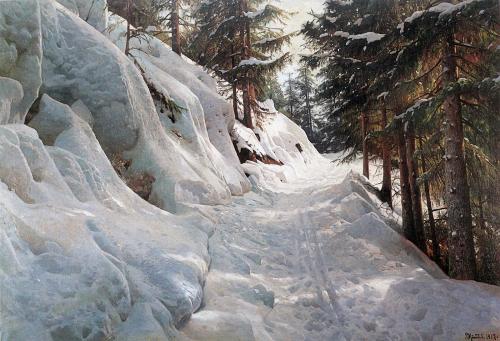
Peder Mørk
_______________________
Stone Stair New York, Part 1
Ian Dreiblatt
drunken boat
contra mundum press has just published a voice full of cities, a heaping anthology of Robert Kelly’s essays, selected by Pierre Joris and Peter Cockelbergh. the book is a winding labyrinth of wonder; trails of intelligence, attention, desire, and pleasure that curl inward and nest among each other. The overdue assembling of them into a book affords an opportunity to feel how richly and intricately these thoughts coexist, how the roof of one serves as floor of another, shared walls enlacing to produce a tremendous contemplative cortex, dotted with sancta in which old gods – the oldest gods – still darkly sleep.
I’ve been particularly rereading one piece from 1971 called Identity Preference Temple-Complex. it’s a short essay that begins by inquiring into ‘certain vectors of desire’ – where does that feeling originate in us, and what are the suns it grows toward? what does it mean to be both made of the past and endlessly multiple in a world of ‘felicities, miseries & confusions?’ remembering Robert Duncan’s notion of The Poet as a single voice spoken thru many mouths in a given age, he wonders whether there might not likewise be a voice – a prounikos he calls it, a ‘carrier’ – some polyvocalic, integral whole of Desire that speaks as the illusorily discrete desires inside each of us.
& as soon as this question is posed, the essay shifts radically and introduces a second section with the observation that scholars of ancient mesoamerica do not refer to mayan population centers like uxmal and palenque as ‘cities’ – rather, they call them ‘temple-complexes’, emphasizing the way in which it was not distinctly economic, military, or agricultural concerns that animated these places, but cultic ones, rituals of tithe, sacrifice, purification, time-keeping, formalized contemplation. So, altho the word will prove very problematic – which we’ll get to – we might casually name as religion the primary force that gave these places coherence.
& then there’s an amazing passage where he turns his attentions to new york city, and describes it, too, as a temple-complex, one where ‘a bewildering hierarchy of temple-functionaries arrives each day… ready to devote (in the technical sense, sphagia) one-third of their biological time to the national cult.’ As to the object of this cult, the question of ‘what god is worshiped on this most complex of all human altars,’ the answer is Preference, the continual act of choosing to think some things better than others and to design a self as the sum total of all these choices. this will be familiar to anyone who’s lived under late capitalism. (Reminiscent of it, I think, is the thesis of Bourdieu’s landmark la distinction, which was published eight years later.) & then, affirmingly, the essay considers some fertile heresies that thrive amid but against the grain of this religion, among ‘those deeply committed to some one or few actual substances,’ like drugs, sex, and poetry, any immersion into ‘the worship of the thing, as meaningful existent.’
...(more)
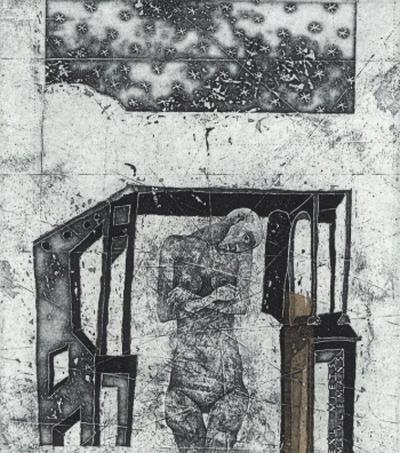 winter
Vladimir Zuev
_______________________
Night Up North
Fabián Severo
Translated from Portuñol by Dan Bellm
Artigas is an abandoned station
the hope left behind by a train that won’t come back
a road that disappears heading south.
*
I don’t know how it is in civilized places
but in Artigas
people have a last name.
Mr. Nobodies
like me—
we come from the border.
Not from this side, not from the other.
The ground we walk on isn’t ours
nor the language we speak.
*
Artigas has a language that nobody owns.
*
This tongue of mine
sticks out its tongue at the dictionary
dances a pagode on top of the map
makes a kite from a schoolboy’s tunic and sash
flies loose and free in the sky.
*
Artigas is a land lost up North
that doesn’t show up on maps.
...(more)
New Voices in Uruguayan Poetry
Jesse Lee Kercheval words without borders
_______________________
Nothing is real
Poetry & poetics of Juan Luis Martínez
Carlos Soto-Román
(....)
During his lifetime, Juan Luis Martínez got to publish just two books. In 1971, he submitted his first book of poems to the Chilean press Editorial Universitaria. After two years of thoughtful review the publisher rejected Pequeña Cosmogonía Práctica (Small Practical Cosmogony) because it was impossible for them to classify. A frustrated Martínez finally decided to self-publish the manuscript in 1977, changing the title to La Nueva Novela (The New Novel). Listed as one the most enigmatic books of Chilean literature, labeled as the first object-book in the history of Chilean poetry, and considered a seminal work, La Nueva Novela stands as an iconoclastic and disruptive book of poetry. Built as an endless maze of quotes, based on a complex system of literary, philosophical, artistic, and scientific references, its fragments, even though they are constantly aiming to different directions, still draw together a coherent poetic unit, where skepticism, irony, and humor are protagonists. Using strategies such as the eradication of the traditional notion of authorship, appropriation, plagiarism, and recontextualization, Juan Luis Martínez perfectly embodies in advance all the premises of today’s conceptual writing. Despite the fact that La Nueva Novela had a poor and restricted circulation, it succeeded in becoming a foundational book, opening the doors of the neo-avant-garde in Chile, and forging an interesting legacy of experimental writing, which still prevails.
...(more)
_______________________
Life is the art of being well deceived.
—Hazlitt
*
I have been systematically rethinking the nature of the lying. The purposes of the liar might be better served by attacking propositional attitudes other than belief. Indeed, I suspect that tyrants often do not want all their underlings to be deluded. If they will act only on what they know, then they can be paralyzed by doubts that do not affect their beliefs.
—Roy Sorensen The Care And Management Of Lies
Gerald Dworkin
3 quarks daily
_______________________
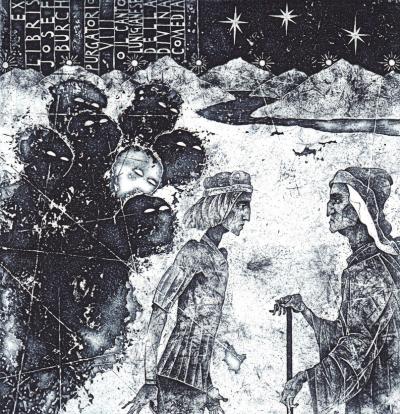
Bookplates by the Russian artist Vladimir Zuev
From the collection of Richard Sica
50 watts
_______________________
the metaphysics of logic
Penny Rush interviewed by Richard Marshall.
3:am
(....)
One important thing that non-classical logics have done that classical logic has not (although, who knows, it may have, had Frege lived longer) is, after stepping carefully in problematic domains, to revise or rebuild completely in the light of suspicious results: classical paradoxes or limitations in areas like quantum physics, the foundations of mathematics, and plain old everyday reasoning in inconsistent or even just possibly inconsistent situations – have all inspired non-classical logics, and as a result we now have logics offering more nuanced and accurate models of deduction across at least some contexts and at most, more contexts than those classical logic can handle.
The advent of such logics means there are not many who would make the claim that classical logic can handle everything the alternatives can – it is widely acknowledged, for instance, that paraconsistent logics can handle inconsistent situations, and classical logic cannot (it explodes). But some may still claim that classical logic is to be preferred nonetheless. Even that sort of claim, though, has now to accommodate the fact of other logics and the apparent failures of classical logic (often quite glaring): so, even if it is to be preferred, the role and nature of classical logic are no longer the straightforward matters they were once considered to be.
(....)
Derrida and Husserl both take seriously the idea that an independent reality is entirely ‘other’ – but they do so in quite different ways. Derrida’s is negative – he shows just how tricky it is to posit a reality which is essentially different from us (or, to draw any sort of line between ‘us’ and ‘reality’) without somehow coming unstuck. He gives lots of good reasons to suspect that something strange is going on whenever we try to articulate any sort of external ‘ground’ in philosophy at all – which he thinks means that traditional, foundational philosophy is in a quagmire, and I guess I agree, but I like the quagmire – we are there because there’s a very interesting fracture that we just keep falling into: one that no bridge (built after scrabbling up one side or the other) can span.
On the other hand, Husserl’s phenomenology grapples more directly with the fracture itself and so the resultant picture, messy and confusing as it is, portrays our situation more faithfully than one which tidies things away too neatly, or is apparently without holes. The point, to reiterate, is that I like that it’s a strange situation we’re in: for one thing, I think allowing it to be strange (rather than trying to resolve it) casts light on a number of other such fractures through philosophical enquiry, but also it just seems right to me that what goes on at the everyday level when we simply discover our world is in fact not simple in the sense of able to be captured in any account reducing the phenomenon: be it to an epistemological process, ontological division, or scientific method. Any such reductions are our own – and that what is not our own (not us) is unsayable needs, I think, saying!
...(more)
_______________________
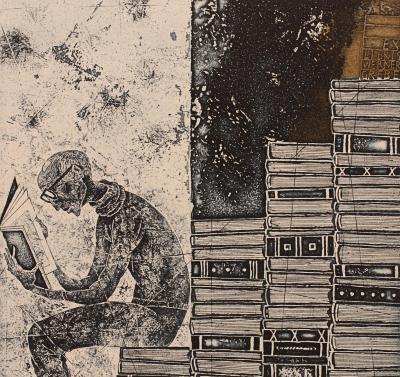
Vladimir Zuev
Art-exlibris.net - The Digital Exlibris Museum
_______________________
A Weapon for Readers
Tim Parks
Imagine you are asked what single alteration in people’s behavior might best improve the lot of mankind. How foolish would you have to be to reply: have them learn to read with a pen in their hands? But I firmly believe such a simple development would bring huge benefits.
We have too much respect for the printed word, too little awareness of the power words hold over us. We allow worlds to be conjured up for us with very little concern for the implications. We overlook glaring incongruities. We are suckers for alliteration, assonance, and rhythm. We rejoice over stories, whether fiction or “documentary,” whose outcomes are flagrantly manipulative, self-serving, or both. Usually both. If a piece of writing manifests the stigmata of literature—symbols, metaphors, unreliable narrators, multiple points of view, structural ambiguities—we afford it unlimited credit. ...(more)

Frédéric Bazille
b. December 6, 1841
_______________________
On selves, forms, and forces
Bruno Latour
Comment on Kohn, Eduardo. 2013. How forests think: Toward an anthropology beyond the human
Journal of Ethnographic Theory
I read How forests think as part of a vast movement to equip anthropologists, and more importantly, ethnographers, with the intellectual tools necessary to handle a new historical situation: the others are no longer outside; nonhumans have to be brought back in the description in a more active capacity. Both of those features, naturally, mark the disappearance of older notions of nature and of its counterpart, namely culture; disappearance, that is itself due to the fact that everybody— ethnographers as well as former informants—are pulled deeper and deeper into the same ecological maelstrom. Whatever the term—is it an ontological or a semiotic turn?—the importance of the book relies on the most crucial turn of all: that is, a turn to experience and how to describe it empirically.
...(more)
via Nicholas RowlandInstalling (Social) Order
_______________________
The Battle in Philosophy: Time, Substance, and the Void – Slavoj Zizek vs. Graham Harman
S.C. Hickman
http://darkecologies.com/2014/12/03/the-battle-in-philosophy-time-substance-and-the-void/
(....)
I’ve begun a long arduous process of tracing down this ancient battle between substantial formalists (object oriented) and non-substantive event (process) based philosophers, and have begun organizing a philosophical work around the great theme of Time that will tease out the current climate of Continental thought against this background.
In some ways I want to take up Zizek’s philosophical materialism of non-substantial self-relating nothingness vs. Harman’s substantial formalism where they intersect in the notions of Time and Causality. We’ve seen work on both of these philosophers, but have yet to see the drama they are enacting from the two world perspectives of ontology vs. the ontic, substance vs. void or gap. I think this would be a worthwhile battle to bring to light what is laying there in fragments.
Stay tuned.
...(more)
_______________________
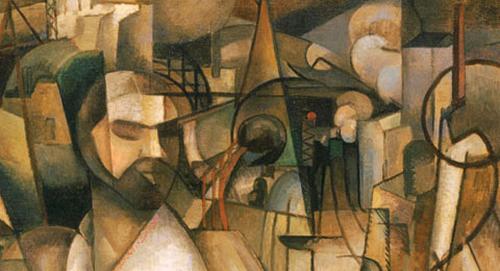
Man on a Balcony
(Portrait of Dr. Morinaud)
1912
Albert Gleizes
b. December 8, 1881
_______________________
like one exile after another
Yu Xiang
excerpted at flowerville
(....)
At this moment, my cry is not a scream
~~~
please believe in an
incorrigibly stubborn life
believe in a severed finger that performs for dead spirits
please leave behind the earth that keeps shattering
ruins that keep shattering
leave behind the mudslide that blocks forklifts and cranes
please leave behind, leave behind
the right not to die
~~~
You can’t see me, as if
you won’t see me in this life again
No one notices me. In the crowd
no one
notices me. I see a body
another body
each blurrier
than the other
...(more)
Yu Xiang’s “I Can Almost See the Clouds of Dust”
Reviewed by Naomi Long Eagleson words without borders
another review by Christina Cook
In Search of a Transient Eternity: Chinese Poet Yu Xiang
Fiona Sze-Lorrain & Yu Xiang
_______________________
Journal of Ethnographic Theory
Vol 4, No 2 (2014)
Special Issue Introduction
Translating worlds
The epistemological space of translation
William F. Hanks, Carlo Severi
Translation has played an important but equivocal role in the history of anthropology and linguistics. At least since Saussure and Boas, languages have been seen as systems whose differences make precise translation exceedingly difficult, if not impossible. More recently, Quine has argued that, in purely abstract terms, reference is ultimately inscrutable and translation between languages is in principle indeterminate. From a Kuhn-inspired point of view, we argue, on the contrary, that the challenge posed by the constant confrontation of “incommensurable” (yet translated) paradigms may become a field for ethnographical inquiry. This approach can provide a new anthropological way to define translation, not only as a key technique for understanding ethnography, but also as a general epistemological principle. Social anthropology would be thus defined not only as the study of cultural differences, but also and simultaneously as a science of translation: the study of the empirical processes and theoretical principles of cultural translation.
_______________________
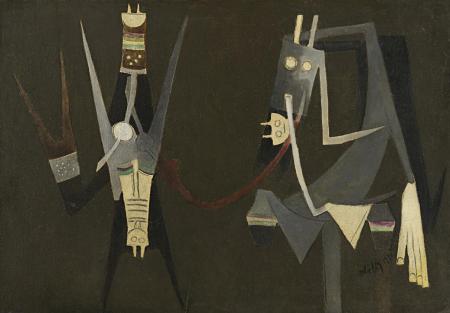
Personnage
1970
Wifredo Lam
b. December 8, 1902
_______________________
The Ode to Translation or the Outcry Over the Untranslatable
Natalia Fedorova
(....)
Translation is the sign of life, it indicates both interest to the phenomenon on a global scale and the presence of the reader (or readers). Translated and translatable also means valuable – something not read in the original language will hardly go through the translation sieve.
Translation in case of electronic literature, written at least in two languages: a natural language and the language of code - is the translation of both. For this reason it has an immence educational potential and can be an and excellent exercise in the process of training to write on digital surfaces. Translation teaches both about the other language, about your own language, and about the work itself. Gregory Rabassa has stated (in his contribution to the Crafts of Translation) that “translation is essentially the closest reading one can give a text,” which suggests that the translation of a computational system to produce linguistic or narrative creativity would involve a very deep analysis and understanding of the system. John Zuern points out that paying attention to what happens “when we translate (or don’t translate) electronic texts will lead to finer-grained insights into the relationship between “electronic” as a category and “literature” as a category”. Just as literary translation allows for an extremely close reading and for new insights about a text, the translation of these text-machine electronic literature works allows for a better understanding of how they are literary and how computing and language come together in them.
For the sleeping e-lit on the Russian and post Soviet space the flow of translated works can be a source of inspiration and a possible way to gain momentum for the future development. It is not only and not so much setting the standard but allowing to understand the paradigm, the way to know what has been done outside the world of Russian language and thought.
...(more)
Futures of Electronic Literature
Marjorie C. Luesebrink and Stephanie Strickland electronic book review
E-lit authors Stephanie Strickland and Marjorie Luesebrink organized a panel on the “Future of E–Lit” at the ELO 2012 conference, allowing emerging and early career authors to articulate institutional and economic, as well more familiar technological, developments that constrain and facilitate current practice. The panel papers were released in ebr in March 2014. Luesebrink and Strickland followed up with comments on the papers, offering a “progress report” on the future of the field. The individual responses are available as glosses on the essays and in full here.
_______________________
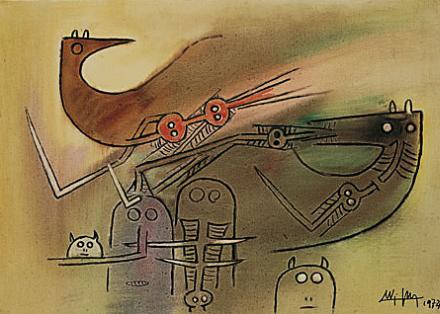
La Rencontre des amis
(Oiseau)
Wifredo Lam
1974
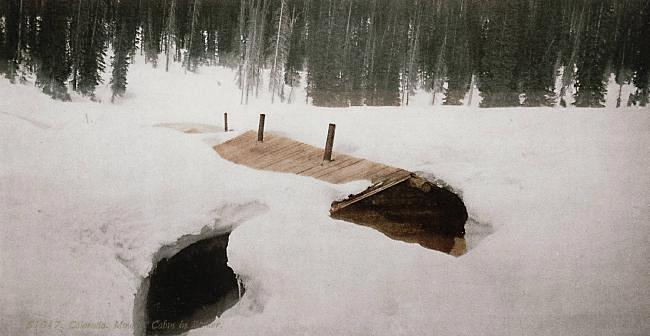
Views Of North America, Ca. 1897-1924
Beinecke Rare Book and Manuscript Library
_______________________
Draft 112: Verge
Rachel Blau DuPlessis
(....)
Sizes, wires, assizes in the site, other boundaries on this border. Maps and lines are drawn over bodies. Where did “history” put this place? Why did it not “stay there”? What about “them”? Should they live here, or are they basically foreign? What are the facts about myself? What is my where? It’s true that once there was an ending. It seemed as if this were what I had wanted. Why did it then open? I hardly can remember, but then it’s suddenly vivid, though even my own stories have veered over time. Another time pulses through the stifled civic membrane.
(....)
“When the axe came into the forest, the trees thought, ‘It’s fine; that handle is one of us.’” What led to what? The incomparable, the scale off, the trans-located, exiled, awkward and alarmed, the clatter, the shattering, have all been part of our lives for so many years. This is what we have. Then you get tired. Then resigned. Then it becomes half noticed. Or less. ...
(....)
Where is one’s own sense of what happened? Can one access one’s own history with others? Articulate its stakes? There is shame on every level. Shame for every side, and rage and shame for micro-twists of fractal sides. Twinned and tripled cataclysmic dreams bleed over all four margins down into the tight-sewn gutter of the page. The book tries to contain and present these bloody verges. It fails. Bad blood escapes.
...(more)
_______________________
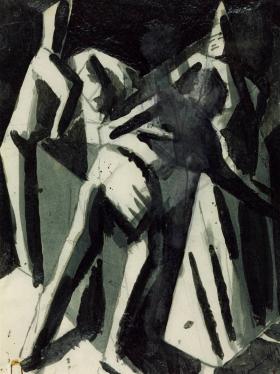
Players
1919
David Bomberg
b. December 5, 1890
_______________________
"Lie close," Laura said,
Pricking up her golden head:
"We must not look at goblin men,
We must not buy their fruits:
Who knows upon what soil they fed
Their hungry thirsty roots?"
"Come buy," call the goblins
Hobbling down the glen.
Goblin Market
Christina Rossetti
b. Dec 5, 1830
_______________________
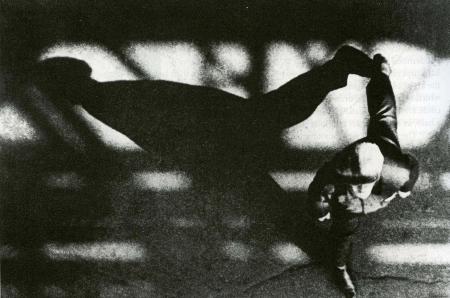
Untitled (Walking Figure)
1928
Alexander Rodchenko
b. December 5, 1891
_______________________
All the Red Young Žižekian Guys
Rose Barnsley
berfois
(....)
It should be understood that the existence of casual gift giving and six generations of iPhones is only made possible by the spectre of extreme poverty. This is not something that can be solved with a telephone campaign and, as such, is not something that any kind of charity is equipped to handle. Charities are, in their very nature, a necessary catharsis. Charities exist because within the current framework children will never stop starving. Žižek is right in saying that charity is not, and never will be, revolutionary. New theories, however, might be.
Today we are trammelled by the thought that what is, is it. This concept props up the ideology of global capitalism. We find ourselves striking small attitudes. Keeping the memory of revolutions past alive appears to us to be all we are capable of, with the monolith of the present being unalterable. Žižek is relevant because he provides an understanding that all that holds it in place is gravity. He may not be able to tell us the form our revolution will take, but he can remind us that there is a form a revolution can take.
...(more) _______________________
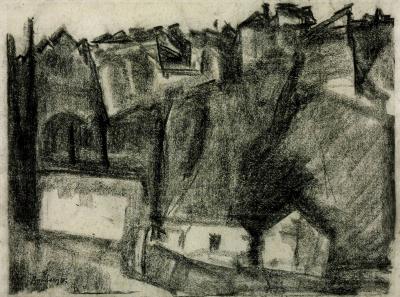
The City on the Rock
Evening, Ronda, Spain
David Bomberg
1935
_______________________
Real talk
For decades, the idea of a language instinct has dominated linguistics. It is simple, powerful and completely wrong
Vyvyan Evans
aeon
(....)
Children have far more sophisticated learning capacities than Chomsky foresaw. They are able to deploy sophisticated intention-recognition abilities from a young age, perhaps as early as nine months old, in order to begin to figure out the communicative purposes of the adults around them. And this is, ultimately, an outcome of our co-operative minds. Which is not to belittle language: once it came into being, it allowed us to shape the world to our will – for better or for worse. It unleashed humanity’s tremendous powers of invention and transformation. But it didn’t come out of nowhere, and it doesn’t stand apart from the rest of life. At last, in the 21st century, we are in a position to jettison the myth of Universal Grammar, and to start seeing this unique aspect of our humanity as it really is.
...(more)
_______________________
Celebrating Bookforum's 20th anniversary
_______________________
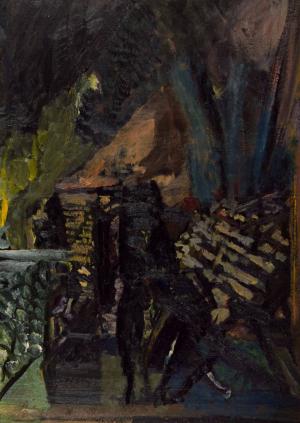
Bomb Store
David Bomberg
1942
_______________________
Stable
Claudia Emerson
1957 - 2014
One rusty horseshoe hangs on a nail
above the door, still losing its luck,
and a work-collar swings, an empty
old noose. The silence waits, wild to be
broken by hoofbeat and heavy
harness slap, will founder but remain;
while, outside, above the stable,
eight, nine, now ten buzzards swing low
in lazy loops, a loose black warp
of patience, bearing the blank sky
like a pall of wind on mourning
wings. But the bones of this place are
long picked clean. Only the hayrake's
ribs still rise from the rampant grasses
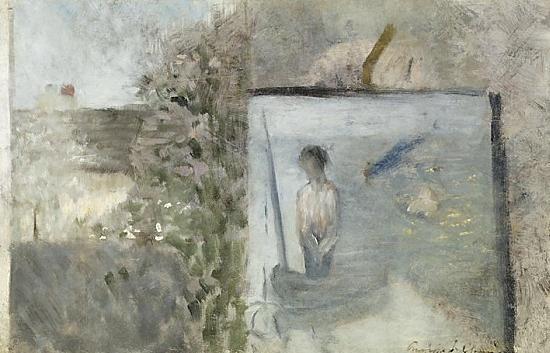
Georges Seurat
b. Dec. 2, 1859
_______________________
The Visible World
Jorie Graham
I dig my hands into the absolute. The surface
breaks
into shingled, grassed clusters; lifts.
If I press, pick-in with fingers, pluck,
I can unfold the loam. It is tender. It is a tender
maneuver, hands making and unmaking promises.
Diggers, forgetters. . . . A series of successive single instances . . .
Frames of reference moving . . .
The speed of light, down here, upthrown, in my hands:
bacteria, milky roots, pilgrimages of spores, deranged
and rippling
mosses. What heat is this in me
that would thaw time, making bits of instance
overlap
shovel by shovelful—my present a wind blowing through
this culture
slogged and clutched-firm with decisions, overridings,
opportunities
taken? . . . If I look carefully, there in my hand, if I
break it apart without
crumbling: husks, mossy beginnings and endings, ruffled
airy loambits,
and the greasy silks of clay crushing the pinerot
in . . .
Erasure. ...
...(more)
Jorie Graham interviewed by Thomas Gardner
_______________________
Round and round
Olli Löytty
Translated by Hildi Hawkins
books from Finland
(....)
When you increase the speed of the movie, you realise that many people go in and out of the house’s doors. It looks as if a revolving door has gone made and is, by turns, sucking people in and chucking them out – them and their belongings. The changing seasons follow their even cycle, leaves changing from browny-red and –yellow to deep green and then pale buds, finally disappearing completely into the wrinkles of the bare branches. The colour of the house brightens and fades, and the birch trees that stand outside it atrophy to saplings that are then dug up and carried away.
I derive particular pleasure from seeing the pastel-coloured two-storey buildings that went up behind the house in the 1980s and 1980s demolished; in their place rise little wooden houses with vegetable gardens. At some point, too, potatoes grow in the garden of my house.
I have been told that gazing backwards is an activity that increases with age. People begin to seek explanations of themselves in the past, their family roots, the places they have visited. Perhaps, in every person’s life, there is a watershed; once one has passed it, one turns one’s gaze back in the direction from which one has come. I myself am still travelling with my gaze fixed firmly forward, but on the level of ideas I understand the wisdom that is hidden in history. It is clear that I would not be as I am if I had not lived the kind of life I have lived, if my parents’ backgrounds and choices had not been those they were. And I would not be myself if I had not lived where I have lived, moved from place to place and finally ended up in the family home, the same house where my grandmother brought up her family and where my parents celebrated their wedding. My family’s path is a circular one, and I have clearly been unable, or perhaps even unwilling, to stray from it.
...(more)
_______________________
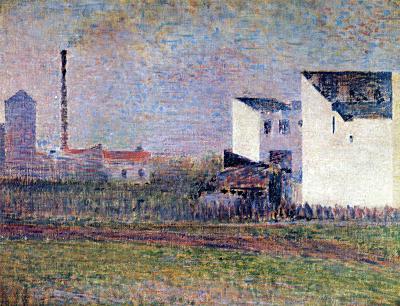 suburb
Georges Seurat
_______________________
writing outside philosophy: an interview with simon critchley
by Andrew Gallix
3:am
... on the one hand, many of the authors I have been obsessed with over the years have endeavoured to take a step outside philosophy, by which is usually meant the circle and circuit of Hegel’s system or Heidegger’s understanding of history as the history of being. I respect and love that gesture, that can be found in Bataille, Levinas, Blanchot and others. But, on the other hand, what I learned from Derrida very early on — my master’s thesis was on the question of whether we could overcome metaphysics — is that the step outside philosophy always falls back within the orbit of that which it tries to exceed. Not to philosophize is still to philosophize. Similarly, any text or philosophy that simply asserts the value of metaphysics is internally dislocated against itself, undermining its own founding gesture. This leave us writing on the margin between the inside and the ouside of philosophy, which is where I’d like to place Memory Theatre.
(....)
3:AM: Would you agree that the memory theatre and the “perfect work of art” envisioned at the end of the book correspond, respectively, to the two poles between which literature oscillates according to Maurice Blanchot? On the one hand, what you have called the “Hegelian-Sadistic” tradition, driven by the work of negation of human consciousness, and on the other, a striving after “that point of unconsciousness, where [literature] can somehow merge with the reality of things” (Very Little . . . Almost Nothing). Both poles, of course, are unattainable, but I suspect you have more sympathy for the latter, which is on the side of “The Plain Sense of Things” (Wallace Stevens) — “the near, the low, the common” (Thoreau) — and “lets us see particulars being various” (Memory Theatre) . . .
SC: That’s very interesting and I stole the “particulars being various” from Louis MacNiece, who is underrated and underread in my view. I remember reading Blanchot’s account of the two slopes of literature and it making a huge impact that continues to reverberate, particularly in relation to the INS [International Necronautical Society] work that I do with Tom McCarthy. On the one hand, literature is a conceptual machine that comprehends all that is, digests it and shits it out. That transforms matter into form. On the other hand, there is a kind of writing — poetry usually (Ponge, Stevens, late Hölderlin) — that attempts to let matter be matter witout contolling or comprehending it. I am more sympathetic to the second slope, but the attempt to let matter be matter without form is also an unachievable fantasy. We can say with Stevens, we don’t need ideas about the thing, but the thing itself. But we are still stuck with ideas about the thing itself, with the materiality of matter. Form, even the form of the formless, is irreducible.
...(more)
_______________________
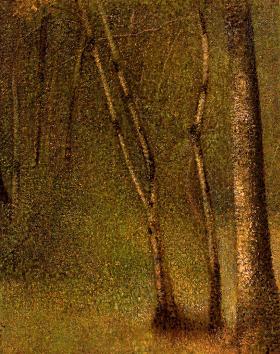
The Forest at Pontaubert
Georges Seurat
_______________________
Between the Species
Volume 17, Issue 1 (2014)
The Summer 2014 issue of Between the Species addresses important theoretical issues that show how careful philosophical reflection about nonhuman animals can help clarify our notions of moral agency, equality, and the nature and scope of our obligations. In addition to these fine examples of philosophical argumentation, we include a work of fiction, “The King of the Meat Eaters,” by an anonymous author. All inquiries concerning this piece may be directed to me, jlynch@calpoly.edu. Also, this issue includes the first interview in the history of the journal. One of our Associate Editors, Angus Taylor, had the opportunity to interview Sue Donaldson and Will Kymlikca, whose book Zoopolis: A Political Theory of Animal Rights is perhaps the most important work in the field in many years. Finally, this issue contains a book review of Lisa Kemmerer’s Animals and World Religions. Animal studieslinks collected by the Book Forum's Omnivore

photo - mw
_______________________
Wintering
Dakota Territory, 1884
Shara Lessley
Already, winter makes a corpse of things.
Snow reshapes what ice has taken. You've lost
interest in letters. So let sunrise come.
Let smoke grow darker by the light of day—
what I could spare of you I've burned already.
The fencepost needs repair. Let sunrise come.
Let panels of light make thirsty the ice-
caked stump of oak. Let the sky go empty
as December's intimations, when in snow
we fashioned ourselves side by side as fallen
angels: yours, the greater wingspan; my outline
barely reaching. Daybreak. I lay my body down
in powder. Roots torque up through the chest's
blankness, snarl of knots unloosed. What comes,
on parting you insisted, will come. Ice splits,
in the distance. What breaks will break. Let it.
posted at Slow Muse
via riley dog
_______________________

One Way Street: Fragments for Walter Benjamin
(1993)
Directed by John Hughes
ubu film
_______________________
The Political Walter Benjamin, a Review Essay
Nitzan Lebovic
Walter Benjamin: A Critical Life by Howard Eiland and Michael E. Jennings.
Working with Walter Benjamin: Recovering a Political Philosophy by Andrew Benjamin
berfois
(....)
Benjamin was, undoubtedly, a melancholic man. A recent book devoted to the subject explained: “Beyond being a personal trait or choice of subject, melancholy represents a cornerstone of his epistemological and metaphysical claims.” Yet his biographers remind us that “to treat Walter Benjamin as a hopeless melancholic is to caricature and reduce him. For one thing, he was possessed of a delicate, if sometimes biting, sense of humor, and was capable of an owlish gaiety”. Indeed, the new biography, a masterpiece of its kind, offers no caricatures. It depicts Benjamin as a multifaceted human being whose own sense of self could be characterized, using one of his favorite adjectives, as intense. Examined here are his interests in friends, playful objects, institutions, political mechanisms, culture, religion, art, gender, law, and even gambling and drugs. But beyond everything else he was an obsessive intellectual who pursued his ideas to a self-destructive degree. He hovered between two opposite states: an intense engagement in both spirit and body and a chilly disinterest that was both personal and intellectual. His thinking proceeded through negation: to think about friendship one began with its demise; objects and institutions were seen via the idea of destruction; culture, via decline; religion, via eschatology and apocalypse; law, via its suspension; and so on.
Benjamin scholarship has grown, during the past two decades, into a vast territory. He has inspired societies, conferences, journals, and countless dissertations; the Benjamin name has become a brand. With this has come the growth of a sort of personal myth, to correct which the biography offers an image of a political Benjamin, “although one that operates at a considerable distance from party politics”. This political Benjamin is not new, but for the first time it is the key to a wide range of his activities, from the critical to the theological, philosophical, and literary. The richly detailed narrative of a life proves as satisfying for theoreticians as for historians.
...(more)
_______________________
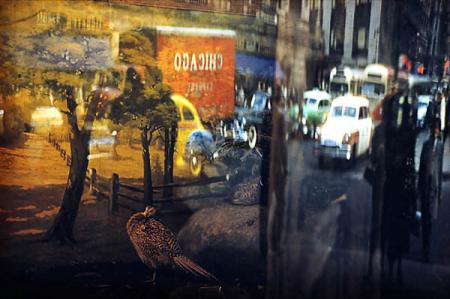
Reflection – 42nd Street
Ernst Haas
1952
_______________________
New Atheism, Old Empire
Luke Savage
jacobin
(....)
At face value, and by its own understanding, New Atheism is a reinvigorated incarnation of the Enlightenment scientism found in the work of thinkers like Bacon and Descartes: a critical discourse that subjects religious texts and traditions to rational scrutiny by way of empirical inquiry and defends universal reason against the forces of provincialism.
In practice, it is a crude, reductive, and highly selective critique that owes its popular and commercial success almost entirely to the “war on terror” and its utility as an intellectual instrument of imperialist geopolitics.
Whereas some earlier atheist traditions have rejected violence and championed the causes of the Left — Bertrand Russell, to take an obvious example, was both a socialist and a unilateralist — the current streak represented by Hitchens, Dawkins, and Harris has variously embraced, advocated, or favorably contemplated: aggressive war, state violence, the curtailing of civil liberties, torture, and even, in the case of the latter, genocidal preemptive nuclear strikes against Arab nations.
Its leading exponents wear a variety of ideological garbs, but their espoused politics range from those of right-leaning liberals to proto-fascist demagogues of the European far-right. ...(more)
_______________________
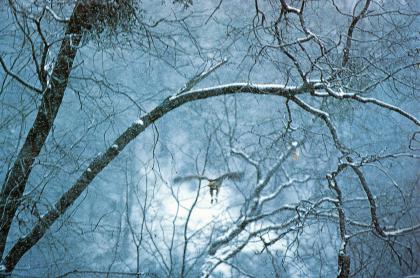
Ernst Haas
1921 - 1986

Randegg in the snow with ravens
Otto Dix
_______________________
Three Poems for the Raven
Amanda Jernigan
the walrus
_______________________
The Wind
Dafydd Ap Gwilym
d. 1350
Translated By Gwyneth Lewis
Skywind, skillful disorder,
Strong tumult walking over there,
Wondrous man, rowdy-sounding,
World hero, with neither foot nor wing.
Yeast in cloud loaves, you were thrown out
Of sky’s pantry, with not one foot,
How swiftly you run, and so well
This moment above the high hill.
Tell me, north wind of the cwm,
Your route, reliable hymn.
Over the lengths of the world you fly,
Tonight, hill weather, please stay high,
Ah man, go over Upper Aeron
Be lovely and cool, stay in clear tune.
Don’t hang about or let that maniac,
Litigious Little Bow, hold you back,
He’s poisonous. Society
And its goods are closed to me.
...(more)
via the page
_______________________
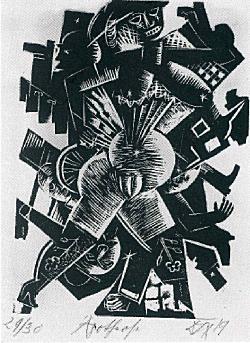
Apotheosis
Otto Dix
_______________________
From Inverse To Pluriverse: Feyerabend’s Cosmological Pluralism
Terence Blake
abstract
Paul Feyerabend is often associated with a destructive criticism leading to an anarchism that flouts every rule and a relativism that treats all opinions as equal. This negative stereotype is based on ignorance and rumour rather than on any real engagement with his texts. Feyerabend’s work from beginning to end turns around problems of ontology and realism, culminating in the outlines of a sophisticated form of pluralist realism. The still largely unknown ontological turn taken by Feyerabend’s work in the last decade of his life was based on four strands of argument: the historical approach, cosmological criticism, the quantum analogy (complementarity), and the primacy of democracy.
The question was posed: Where are we when thinking computationally? Following an indication from Michel Serres my answer is: in the Cavern with its multiple luminosities.
_______________________
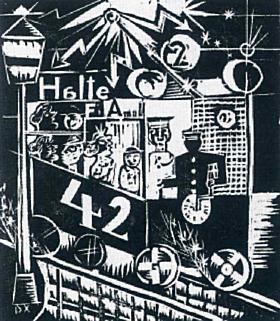
Electrical
Otto Dix
_______________________
Bergsonian Reflections on Writing
Larval Subjects
(....)
... is there anything more posthuman for the human than writing? Embodied cognition focuses on rhyme, plot, and personification as mnemonic devices. If it rhymes I can recite it because the rhythm of language draws me to the next moment in the sequence. If it has a plot involving personified entities, I can remember it because it is interpersonal relations that define me most fundamentally in my day to day thought. Yet with writing, abstraction becomes possible. I can think of simple marks like “1” or “**” and the relations that obtain between them. I depart from narrative, plot, personification, rhyme to enter the realm of abstractions, of that which is beyond the human. It is impossible to conceive of philosophy, of science, of law, of mathematics without writing. These things simply aren’t possible for flesh memory. Inscription is required so that we might surmount the limitations of our flesh. And who knows, perhaps even the fantasy of the soul as that which survives death is something that arises specifically from writing, from that which preserves in the inscription and that reifies a thought allowing us to say something like “being” where everywhere there is really only becoming.
In this regard, it could be said that writing is a perfect example of what Bergson calls “extension” or “spatialization”. Writing is the spatialization of thought. Bergson is hard on spatialization, seeing it as a betrayal of being’s true nature as duration or becoming, as flow. For Bergson, spatialization is death for it is that which halts and fixes the flow of becoming. Perhaps there’s a death in the tattoo, for the tattoo is certainly a monument. Perhaps every writing is a bit of a corpse. Yet as the above attests, there is a poet and productivity in the corpse that isn’t to be found in flow. Or rather there’s a specific flow that takes place in extensity, in spatialization, that isn’t otherwise possible. It’s impossible to imagine Newton’s Principia, Hegel’s Logic, Spinoza’s Ethics, or, ironically, Bergson’s Matter and Memory, without spatialization. The flesh alone simply isn’t capable of such thought and as a consequence writing, inscription, is central to the ecology of all contemporary thought.
...(more)
_______________________
Around the Globe: International YA Writing
Words without Borders Dec. 2014
Around the Globe: An Introduction to International YA Writing
Briony Everroad
If you can get past the thick fog of casual snobbery that always seems to envelop this subject, it seems perfectly obvious that a lot of the most interesting writing happening in the English-speaking world just now is being published as YA (young adult) fiction. Obvious, at least, to those who actually bother to read it, rather than those who don’t but still comment on how it is all, necessarily, unsophisticated, derivative, and shallow. Yes, of course there's some bad YA writing out there, which is bad, and then there's also some really good writing, which is really good—and everything in between.
While writing for teenagers wasn’t invented in the last decade or two, it has certainly, in that time, gained a visibility, a range, a thoughtfulness, even a sort of urgency, with powerful stories asking important questions in a new and irresistible array of voices. There is a generation of twentysomethings in the Anglophone world whose key texts, the books that made them readers, were books we might consider YA. And indeed, reader surveys have shown that many of the books thus categorized in fact sell to those over eighteen in greater numbers than to those below that age. Some may fear that this trend is a symptom of the way adulthood is becoming infantilized, but we see it quite differently, as an encouraging indication that there are certain things that, quite simply, the best YA fiction has lately been getting very right.
...(more)
_______________________
La Place de L’Etoile
Patrick Modiano
translated from the French by Pepe Karmel
In what we believe to be the first American publication of Patrick Modiano’s work, in AGNI 10/11 (1979),the 2014 Nobel Prize winner brings readers into a confused dream, blending identities and languages in a way that belies and unsettles the solid-seeming truths of the post–World War II era. Anti-semitism, Judaism, martyrdom, self-loathing, self-knowledge, loyalty, sacrifice—the mix is heady, and as we read we feel our convictions shift until we find we have completely lost our footing. Left trying to fit our puzzle scraps of certainty into some picture of sense, readers of this piece will recognize Modiano’s exceptional talent, already clearly evident thirty-five years ago.
_______________________
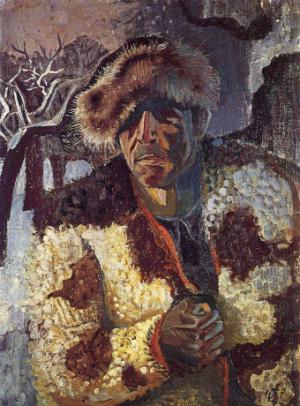
Self-portrait with fur cap
Otto Dix
b. December 2, 1891,
_______________________
Helen DeWitt
interviewed by Mieke Chew
bomb
(....)
Halfway through my sophomore year, I took a leave of absence. I went away, and I was working as a chambermaid in Provincetown. Proust’s À la recherche du temps perdu is one of the things I bought there. I’d studied French in school, so I thought: I can read Proust. I was able to do this precisely because I was not in college. There was such irony. The only way I could find time to read Proust was while working as a chambermaid. Or Pound. Or Eliot. Pound thought that if there was good poetry in a language, then you should learn enough of that language to read the poetry. Your typical language course is completely misguided. You go through all this stuff about what your hobbies are, and you are not interested in what people are doing, chatting amongst themselves about their jobs, their golf. No! You want to read the great poetry and start there. Pound was single-minded about that. And that was inspiring because surely if you want banality, you don’t have to go looking for it in another language—you have your mother tongue.
...(more)

photo - mw
_______________________
Lines for Winter
Mark Strand
1934 - 2014
for Ros Krauss
Tell yourself
as it gets cold and gray falls from the air
that you will go on
walking, hearing
the same tune no matter where
you find yourself—
inside the dome of dark
or under the cracking white
of the moon's gaze in a valley of snow.
Tonight as it gets cold
tell yourself
what you know which is nothing
but the tune your bones play
as you keep going. And you will be able
for once to lie down under the small fire
of winter stars.
And if it happens that you cannot
go on or turn back
and you find yourself
where you will be at the end,
tell yourself
in that final flowing of cold through your limbs
that you love what you are.
In Memoriam: Mark Strand, 1934–2014
Dan Piepenbring paris review
_______________________
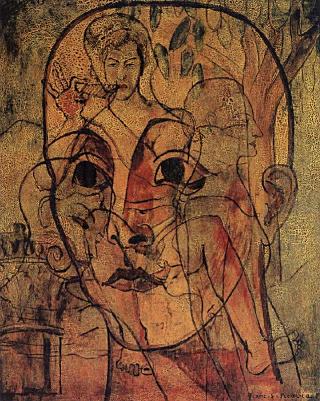
Chloris
Francis Picabia
d. November 30, 1953
_______________________
A Resistance to Theory
Part 1 of 2
Paul Park
conjunctions
She stood outside the lecture hall examining the poster. The image was murky, perhaps a tattooed human face, perhaps a tribal mask. Under the title of the talk, Professor Farinelli had included this bio in small print:
My writing has focused on developing a critical theory that would support an ethnography of the postanthropologic otherwise. My recent work examines the hegemony of the predeceased in late liberal settler colonies from the perspective of the politics of embodiment, eroticism, and narrative form. My ethnographic analysis is illuminated by a critical assignation with the traditions of American pragmatism and continental theories of immanence and intimacy.
Seldom had Yvette felt such excitement. And yet her hands did not shake. It had been raining outside the library, a cold November drizzle. Momentarily she laid her right palm against the polished surface of the wall and laid her forehead there too. She caught a glimpse of a blurry reflection before she turned away. “Immanence,” she whispered. “Eminence. Imminence.” The words themselves were interchangeable, designed for a purpose not limited to comprehension. Even she, defeated as she’d been by stuff like this, could see the beauty of that purpose if you let your mind go.
...(more)
_______________________

Sun Over the Pine Forest
1913
Karl Schmidt-Rottluff
b. December 1, 1884
_______________________
A Walking Tour of Light
Leif Schenstead-Harris
word hoard
(....)
... True thought, counterfeit thought, counterfeit true thought and truly counterfeit thought? In language these are difficult questions, and under the present light the questions become dim—the light is passing, Babel has fallen, and clamorous questions are being raised.
Perhaps the sun is not gone quite yet, however. These words I offer up as counterfeit: walk towards the light; head into the darkness. Fear no censors. Their doublespeak cannot regulate silence. But watch, with Cavafy’s carefully ironic Watchman at the turn of modernity, for the Atreids’ return:
The light is good; good are those en route;
and all they say and do is also good.
So let us pray things turn out well. And yet
Argos is capable of making do without
Atreids. Royal houses aren’t everlasting.
People, certainly, will be saying all sorts of things.
As for us, let’s listen. But we won’t be taken in
by ‘the Indispensable,’ by ‘the One and Only,’ by ‘the Great.’
They always find another straightaway
who’s indispensable, the one and only, the great.
...(more)
_______________________

Karl Schmidt-Rottluff
_______________________
The End
Mark Strand
Not every man knows what he shall sing at the end,
Watching the pier as the ship sails away, or what it will seem like
When he’s held by the sea’s roar, motionless, there at the end,
Or what he shall hope for once it is clear that he’ll never go back.
When the time has passed to prune the rose or caress the cat,
When the sunset torching the lawn and the full moon icing it down
No longer appear, not every man knows what he’ll discover instead.
When the weight of the past leans against nothing, and the sky
Is no more than remembered light, and the stories of cirrus
And cumulus come to a close, and all the birds are suspended in flight,
Not every man knows what is waiting for him, or what he shall sing
When the ship he is on slips into darkness, there at the end.
|





































